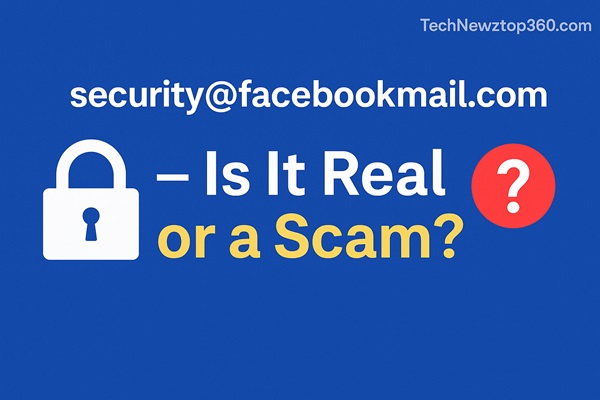Introduction to security@facebookmail.com
If you’ve ever received an email from security@facebookmail.com your first thought was probably:
“Is this real or just another scam trying to steal my Facebook password?”
You’re not alone. Every day, thousands of Facebook users receive notifications that look official — “Your account has been locked,” “Unusual login attempt detected,” or “Password reset requested.” Some are genuine; others are carefully crafted phishing emails designed to trick you.
In this detailed guide, we’ll help you understand exactly what security@facebookmail.com, is, how to spot fake Facebook emails, and what you can do to stay safe online.
(Related: Learn how software verification works in our Doge Software Licenses Audit HUD Guide)
What Is security@facebookmail.com
Before labeling it as real or fake, let’s understand what this address really is.
security@facebookmail.com is an official email domain used by Facebook to send automated messages related to:
- Password resets
- Login attempt alerts
- Account recovery instructions
- Security updates and policy changes
- Notifications about unrecognized devices
These messages are generated directly by Facebook’s servers, not human support staff. In short, if you requested a password reset or enabled two-factor authentication, Facebook may legitimately email you from this domain.
However, cybercriminals know this too — and that’s where the confusion begins.
Is security@facebookmail.com Legit or a Scam?
The answer depends on context.
- ✔️ Legit: When triggered by a real Facebook activity (like login attempt or password reset).
- ❌ Fake: When used by scammers pretending to be Facebook to steal personal data.
That means “security@facebookmail.com can be both legitimate and misused — just like how counterfeit hardware sometimes mimics real parts.
(Think of it like verifying industrial modules in our QY-45Y3-Q8W32 Model Guide — the label may look real, but you need to confirm authenticity.)
How to Check if a Facebookmail Email Is Real
Here are the five key checks you can do to confirm whether your message from security@facebookmail.com is genuine:
1. Check the Sender Domain Properly
Always inspect the sender’s full address — not just the name.
Legit messages come only from:
👉 @facebookmail.com or @support.facebook.com
If you see anything else (like @facebo0k.com, @fbsecure-mail.com, or random numbers), it’s fake.
2. Inspect the Message Content
Facebook will never ask for your password, payment details, or credit card information in an email.
If the message sounds threatening (“Your account will be deleted in 24 hours!”) or urges immediate action, treat it as suspicious.
3. Verify Inside Facebook
Go to your Facebook app or website →
Settings → Security and Login → Emails from Facebook.
This section lists every official email sent to your account.
If the email appears there, it’s authentic.
4. Hover (Don’t Click!) on Links
Move your mouse over any link in the email without clicking it.
A real Facebook link will start with:
👉 https://www.facebook.com/
Fake ones might include subtle typos, like https://facebook.com-security-login.xyz.
5. Check Timing and Context
Did you recently try to reset your password or log in from a new device?
If yes, the email could be legitimate.
If not — be cautious.
Examples: Real vs. Fake Facebookmail Emails
| Feature | Legit Facebookmail Email | Fake Phishing Email |
|---|---|---|
| Sender | security@facebookmail.com | facebook@secure-alert-mail.com |
| Subject | “A new login to your account was detected” | “URGENT! Your account will be deleted” |
| Links | facebook.com URLs | Random shortlinks or non-FB domains |
| Tone | Informative, calm | Threatening, urgent |
| Attachments | None | Often contains malicious links or PDFs |
(Just like technical specs differ in DK380C4.0-H8 hardware modules , legitimate Facebook emails have consistent, verifiable patterns.)
How Facebook Uses @facebookmail.com Safely
Facebook uses the @facebookmail.com domain for scalability and to separate its notification system from its main web servers.
This helps them send millions of legitimate notifications every day without risking downtime or spam flagging.
Common legitimate uses include:
- Login alerts
- Password resets
- New device sign-ins
- Account ownership verifications
So yes — emails from security@facebookmail.com can be genuine, but always confirm authenticity.
Common Signs of Fake Facebookmail Emails
Phishing scams are getting smarter, but they always leave small clues. Watch for these red flags:
- Misspellings and grammar errors
Example: “We detect unusual login on you’re account.” - Urgent calls to action
Example: “Act immediately to keep your account!” - Suspicious links or attachments
Never download ZIP files or open PDFs claiming to verify your account. - Requests for sensitive information
Facebook never asks for passwords, card numbers, or OTPs. - Emails not shown in your Facebook “Security and Login” settings
What To Do If You Receive a Suspicious Email
If you suspect an email from security@facebookmail.com is fake, follow these steps immediately:
- Do not click any links.
- Do not reply. Scammers often verify active addresses through responses.
- Report it to Facebook by forwarding it to phish@fb.com
- Delete the email.
- Change your Facebook password and enable two-factor authentication (2FA).
Bonus Tip: Use trusted antivirus software and regularly review your login history inside Facebook.
Why Hackers Use Fake Facebookmail Emails
Cybercriminals love to impersonate trusted domains like @facebookmail.com because they instantly sound legitimate.
Their goal? To get you to:
- Reveal your password, or
- Click a malicious link installing spyware.
They rely on fear and urgency. That’s why education is your best defense — the more you know about how these scams work, the less likely you are to fall for them.
Expert Security Tips to Stay Safe Online
- Use a unique password for each platform.
- Turn on Two-Factor Authentication (2FA) — always.
- Keep your browser and OS updated.
- Avoid clicking links in emails when in doubt — log in directly.
- Regularly check your Facebook “Security and Login” section.
- Use an email provider with phishing protection.
- Educate friends and family. One shared mistake can expose everyone.
How to Contact Facebook Safely
If you ever need to verify a message or report suspicious activity:
- Go to https://www.facebook.com/hacked
- Or visit https://www.facebook.com/help/ for verified support pages.
- Never trust random “Facebook Support” emails that ask for payment or account access.
Conclusion
So, is security@facebookmail.com real or a scam?
✅ Yes, it’s real — but only when verified correctly.
The safest way to confirm is by checking your Facebook Security and Login > Emails from Facebook section. If it’s not listed there, it’s fake — no exceptions.
In today’s digital world, phishing attacks look more realistic than ever. Staying alert, informed, and cautious is the best way to protect your Facebook account and your personal data.
FAQs — security@facebookmail.com Explained
It’s used by Facebook to send official account alerts, password resets, and login notifications.
Go to Settings → Security and Login → Emails from Facebook.
Yes, scammers can spoof the address, so always verify before clicking.
Change your password immediately and enable 2FA.
It separates notification servers for better reliability and spam control.
No — official Facebook emails don’t require replies.
Yes, Facebookmail.com operates globally.
Nothing bad — ignoring or deleting it keeps you safe.
No, Facebook never contacts users by phone or SMS about account issues.
Forward it to phish@fb.com or report it directly via your Facebook help center.


